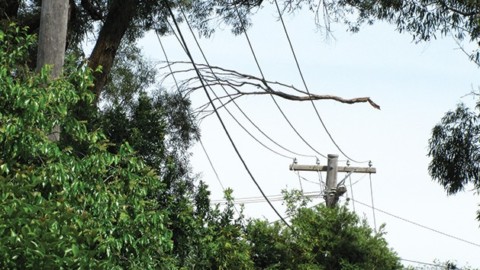by Michelle Goldsmith, Utility Associate Editor
nbn has finalised a number of new construction contracts with its delivery partners to extend the National Broadband Network’s fixed-line footprint to another 4 million premises. These contracts are based on a revised Multi-technology Integrated Master Agreement, involving simplified performance-based contracts intended to reduce administrative overheads, enhance competition, enable flexibility and incentivise a faster, more effective NBN rollout.
We took the opportunity to speak with spokespeople from nbn and some of its construction partners to learn more about the new contracting arrangements and what they mean for the project as a whole.
Teaming up to fast-track the NBN
The first agreements signed under the new contracting model were between nbn and rollout partners Transfield, Downer, Visionstream, Silcar, Fulton Hogan and WBHO. All in all, these agreements combine to cover approximately 4 million premises across Australia.
These premises are located within the fixed line NBN footprint and include homes and businesses within the additional 200,000 premises added to the 18-month rollout schedule detailed in the newest version of the nbn Multi-technology Rollout Plan.
In a recent statement, nbn CEO Bill Morrow said that the renegotiated contracts were a vital factor in allowing the company to schedule such a large volume of construction to begin over the next 18 months, which he described as an “important step toward reaching our goal of connecting eight million premises to the nbn network by 2020”.
Connections to the NBN will occur through the use of fibre-to-the-node (FTTN), fibre-to-the-premises (FTTP) and fibre-to-the-building/basement (FTTB) technologies. The technology used to connect each individual premise will be determined according to the nbn Multi-technology Deployment Principles. They do not however, include connection to the HFC network, for which other contracting arrangements will be made.
Initial multi-technology contracts awarded
Utility talked to spokespeople from Downer and Transfield to discuss their new contracts in more detail.
Downer signed a five-year contract with nbn valued at approximately $100million in the first year.
“The value of the contract in subsequent years will depend on the volumes allocated by nbn as the rollout continues under the Multi-technology Integrated Master Agreement (MIMA),” said a spokesperson for Downer. “In the first year of the MIMA rollout, Downer is forecast to make the NBN available to approximately 144,000 premises in Queensland, New South Wales and Western Australia. This is in addition to the work volumes on hand under the previous contracting model.”
For the past two and a half years, Downer has been successfully rolling out the FTTP network in New South Wales, Victoria, Queensland, Western Australia, South Australia and the Australian Capital Territory under the previous contracting agreement, the Network Services Master Agreement (NSMA).
Transfield’s new contract with nbn is worth up to $140million in the first year.
“We expect to make the NBN available to well over 200,000 premises in New South Wales and Victoria by June 2016,” said a spokesperson for the company.
The new agreement comes in addition to Transfield’s two previously announced contracts for the NBN rollout in Victoria, which included a two-year, $300million extension to continue the Local/Distribution Network design, as well as construction of the Fibre Optic Network, and a two-year $66million contract for the construction of exterior house pre-connections.
Visionstream also signed a new MIMA contract, valued at approx. $270million in the first year, that will see the company construct FTTN and FTTP across Queensland, New South Wales, Victoria and Tasmania.
Silcar, Fulton Hogan and WBHO were also awarded new contracts, of undisclosed value.
The terms of the agreements formally came into effect on 1 July 2015 and works on the new premises are already underway. nbn states that further contracts are likely to be finalised in the near future.
A result of industry input
The new contracting arrangements were formulated as a result of extensive consultation with nbn’s delivery partners to make sure contracts were less complex, easier to administer, more competitive and incentivised great results as the company ramps up works to accelerate the rollout.
“nbn’s industry management team has been working closely with all stakeholders across the industry, spending many months to ensure the terms instill the principles of competition and flexibility,” said an nbn spokesperson.
Both Downer and Transfield were involved in the consultation process leading to the new arrangements.
Keeping network construction rolling
An nbn spokesperson said that flexibility was key to the differences between the new contracting agreements and those under the old model.
“The new contracts are a marked departure from the old commercial model, which guaranteed large volumes of work yet placed high administrative burden on delivery partners. They also create competition, where successes from our delivery partners can be rewarded with more volume.”
The previous contracting arrangements guaranteed suppliers with set amounts of work in specific states and regions regardless of performance and created higher administrative overheads. In contrast, the revised contracts enable flexibility in volume commitments, competition between delivery partners, and pricing based on outcomes rather than inputs.
Under the new contracting agreements, six-month parcels of work are released to delivery partners, whose performance is evaluated according to a matrix based on the key criteria of the speed and delivery of the rollout, quality and adherence to safe work practices. Contractors who perform well according to these criteria may be rewarded with additional volumes of work.
“All three are equally important,” said the company spokesperson, “with volume and timing sequenced to release more work once current assignments reach their milestones.”
Rewarding construction excellence
The new arrangements have been met with a largely positive industry response and the nbn delivery partners we spoke to were confident about their ability to secure additional work via performance excellence.
A spokesperson from Downer said “Although the work done is similar, the new contract is more outcome focused. It provides us with more flexibility, such as flexibility with construction methodology in connecting the NBN from the main network. The new contract also provides Downer with greater opportunity for increased work volume through delivering excellent performance.”
A Transfield spokesperson said, “The new contracts have a fixed program of work that enables us to better plan and program the works. They are also less prescriptive and more outcome-based, which reduces much of the administrative burden and allows us the flexibility to better manage our works with regard to our approach and timing.”
“The performance criteria of the new contract focus mainly on the speed and coverage of the rollout, quality of the works and health & safety. The flexibility and ownership we attain from the new contract enables us to focus on positive outputs that satisfy these criteria. This approach suits Transfield Services as we have been one of the NBN industry leaders in these areas over the last four years.”
The contractors also envisaged a smooth transition from the full fibre rollout of the past to a multi-technology rollout, citing their comprehensive experience with various network types and the similarities of the works on a construction level.
According to a Transfield spokesperson, “The technology we have rolled out over the last four years has been FTTP. The new contracts utilise a mix of FTTP, FTTN and FTTB, although there will be a higher focus on the FTTN to utilise the existing copper network. Transfield Services has had extensive experience with design, construction and maintenance of Telstra’s copper network in New South Wales and Queensland, and we still have significant contracts involving the copper network in New Zealand. Although the technology is different, the nature of the construction activities is very similar.”
“We have been connecting premises to the NBN in New South Wales and Victoria for nearly four years under our existing NBN contracts, so this new model is more about adapting our business operations to the changes in technology and commercial approach.”
A contractor’s perspective of the NBN
Both Downer and Transfield were passionate about the benefits their companies can realise through the performance incentives instilled in the new contracts and by working on such a substantial infrastructure project in general.
“A contract like this is an example of the future direction Transfield Services is taking in terms of investing in capability so that we can participate meaningfully in rolling out the right infrastructure for the benefit of all stakeholders – including our clients, their customers and our shareholders,” said the Transfield spokesperson. “We also have the potential to create our own future – one that builds on our existing relationships with key clients such as NBN. In turn, our credibility grows and we win more work with more clients.”
Downer said “The goal of the NBN is to deliver Australia’s first national wholesale-only, open access broadband network to all Australians. As a leader in the communications sector in both Australia and New Zealand, we are delighted to be supporting the rollout of this significant project.”
The new streamlined contracting agreements look set to enable nbn’s delivery partners to get on with their job of delivering Australia’s National Broadband Network as quickly, effectively and safely as possible. They also provide an example of a positive project partnership and contract renegotiation achieved through consultation with contractors and other stakeholders.

















